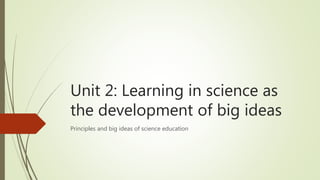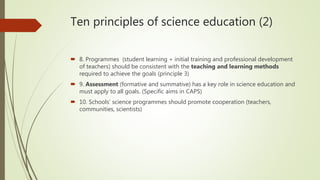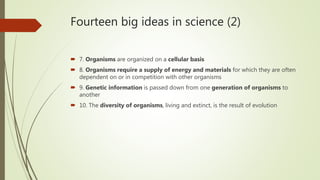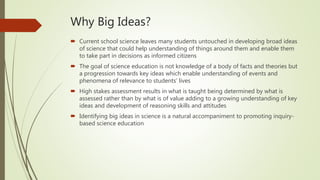Unit 2 learning in science as the development of big ideas
- 1. Unit 2: Learning in science as the development of big ideas Principles and big ideas of science education
- 2. Ten principles of science education (1) ’é┤ 1. Develop and sustain learnersŌĆÖ curiosity about the world and enjoyment of scientific activity ŌĆ”ŌĆ”ŌĆ”ŌĆ”ŌĆ”ŌĆ”ŌĆ”ŌĆ”. ’é┤ 2. Take and informed part in decisions, take appropriate actions, that affect their own wellbeing and the wellbeing of the society and the environment ’é┤ 3. Multiple goals: ’é┤ Set of ŌĆśbig ideasŌĆÖ: ideas of science, ideas about science, its role in society ’é┤ Gathering and using evidence ’é┤ Scientific attitudes ’é┤ 4. Clear progression (ideas need to be achieved at various points ŌåÆ goals) ’é┤ 5. Topics of interest to students and relevance in their lives ŌåÆ progression towards big ideas ’é┤ 6. Learning experiences should reflect a view of scientific knowledge and scientific inquiry that is explicit ’é┤ 7. Curriculum activities should deepen understanding of scientific ideas (+ fostering attitudes and capabilities)
- 3. Ten principles of science education (2) ’é┤ 8. Programmes (student learning + initial training and professional development of teachers) should be consistent with the teaching and learning methods required to achieve the goals (principle 3) ’é┤ 9. Assessment (formative and summative) has a key role in science education and must apply to all goals. (Specific aims in CAPS) ’é┤ 10. SchoolsŌĆÖ science programmes should promote cooperation (teachers, communities, scientists)
- 4. Fourteen big ideas in science (1) Ideas of science + ideas about science ’é┤Ideas of science ’é┤ 1. All material in the Universe is made of very small particles ’é┤ 2. Objects can affect other objects at a distance ’é┤ 3. Changing the movement of an object requires a net force to be acting on it ’é┤ 4. The total amount of energy in the Universe is always the same but energy can be transformed when things change or are made to happen ’é┤ 5. The composition of the Earth and its atmosphere and the processes occurring within them shape the EarthŌĆÖs surface and its climate ’é┤ 6. The solar system is a very small part of one of millions of galaxies in the Universe
- 5. Fourteen big ideas in science (2) ’é┤ 7. Organisms are organized on a cellular basis ’é┤ 8. Organisms require a supply of energy and materials for which they are often dependent on or in competition with other organisms ’é┤ 9. Genetic information is passed down from one generation of organisms to another ’é┤ 10. The diversity of organisms, living and extinct, is the result of evolution
- 6. Fourteen big ideas in science (3) ’é┤Ideas of science ’é┤ 11. Science assumes that for every effect there is one or more causes ’é┤ 12. Scientific explanations, theories and modes are those that best fit the facts known at a particular time ’é┤ 13. The knowledge produced by science is used in some technologies to create products to serve human ends ’é┤ 14. Applications of science often have ethical, social, economic and political implications
- 7. Why Big Ideas? ’é┤ Current school science leaves many students untouched in developing broad ideas of science that could help understanding of things around them and enable them to take part in decisions as informed citizens ’é┤ The goal of science education is not knowledge of a body of facts and theories but a progression towards key ideas which enable understanding of events and phenomena of relevance to studentsŌĆÖ lives ’é┤ High stakes assessment results in what is taught being determined by what is assessed rather than by what is of value adding to a growing understanding of key ideas and development of reasoning skills and attitudes ’é┤ Identifying big ideas in science is a natural accompaniment to promoting inquiry- based science education
- 8. Identifying big ideas in science ’é┤ If we want students to develop their understanding of science through inquiry we need to identify the course of cognitive progression ŌĆ” which ideas need to be achieved? ’é┤ Consider the principles of science education ŌĆ” these principles will guide us about the goals and procedures of science education ’é┤ Ten principles underpinning the science education ŌåÆ explain the thinking behind the selection of 14 big ideas (10 ideas of science and 4 ideas about science) ’é┤ How do we progress towards achievement of the identified idea? ’é┤ What are some of the implication for classroom practice?
- 9. A few examples of Big Ideas ’é┤ Chemistry ŌĆō Topic: Chemical reactions: specifically oxidation reactions ’é┤ Big idea: Chemical processes can cause a change in the chemical, and therefore physical, properties of substances ’é┤ Life sciences ŌĆō Topic: Inheritance from sexual reproduction ’é┤ Big idea: Each sex cell has a random combination of alleles, and different combinations of sex cells would result in different combinations of alleles, and hence, different physical characteristics ’é┤ Earth science ŌĆō Topic: The relationship between the pressure below the earthŌĆÖs surface and pressures above the earthŌĆÖs surface ’é┤ Big idea: The geologic processes below earthŌĆÖs surface can result in observable changes on the earthŌĆÖs surface








